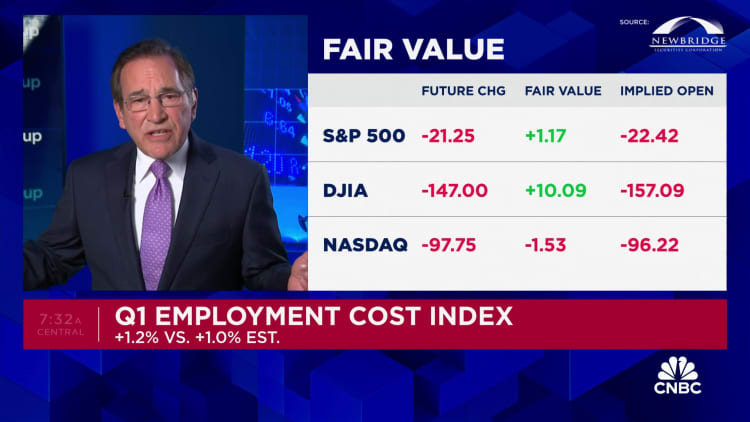
Employee compensation costs jumped more than expected to start the year, providing another danger sign about persistent inflation, while consumer confidence hit its lowest level in nearly two years.
The employment cost index, which measures worker salaries and benefits, gained 1.2% in the first quarter, the Labor Department reported Tuesday. That was higher than 0.9% in the fourth quarter of 2023 and above the Dow Jones consensus estimate for a 1% increase.
In the larger picture, the rise added to concerns that a string of 11 Fed interest rate hikes has not done enough to ease price pressures and likely helps keep the central bank on hold before it can start easing monetary policy.
The Fed watches the ECI as a significant measure of underlying inflation pressures.
The rate-setting Federal Open Market Committee begins its two-day meeting Tuesday. Markets have priced in virtually no chance that the FOMC will change the target for its overnight borrowing rate from the current range of 5.25%-5.5%.
A separate report Tuesday showed that the Conference Board’s Consumer Confidence Index slipped
After the ECI index release, traders changed their outlook on the first cut coming in September, moving the odds to about a coin flip, according to the CME Group’s FedWatch measure of fed funds futures pricing. The implied probability of no cuts this year also rose to about 23%, after being near zero just a month ago.
On a year-over-year basis, compensation costs for civilian workers increased 4.2%, still above a level the Fed feels is consistent with its 2% inflation goal, though down from 4.8% a year ago. Wages and salaries rose 4.4% while benefits costs increased 3.7%.
State and local government workers saw their compensation costs rise 4.8%, down just narrowly from the same period in 2023. The bigger increase likely was attributable to the high level of that group belonging to unions, which saw compensation costs increase 5.3%, compared with just a 3.9% gain for nonunion workers.
The Conference Board’s measure brought another reminder of worries over inflation.
The Consumer Confidence Index slipped to 97, a decline of 6.1 points that was below the Wall Street estimate for 103.5. Though the Present Situation index also fell, it is still at a level that “continues to more than offset concerns about the future,” said Dana Peterson, the board’s chief economist.
Responses to the survey indicated worries over “elevated price levels, especially for food and gas, dominated consumer’s concerns … with politics and global conflicts as distant runners-up,” Peterson added.







